
Guests
- Arshak MakichyanRussian Armenian climate and antiwar activist, now based in Berlin after his Russian citizenship was revoked in 2023.
We continue our coverage of the COP29 U.N. climate summit hosted in Baku, Azerbaijan, with a look at Azerbaijan’s treatment of the country’s Armenian minority population. Last year, the Azerbaijani government ethnically cleansed Armenians from the disputed Nagorno-Karabakh region, leading to the forced expulsion of some 100,000 Armenians from the enclave and gruesome human rights violations, including cultural erasure and the torture and mass killing of civilians. There are at least 23 known Armenian political prisoners currently held in Azerbaijan and many more who are not identified. These colonial policies against Armenians “started long ago,” says Armenian climate and antiwar activist Arshak Makichyan. He calls out the silence of international actors on the persecution of Armenians during COP29, stating that “Azerbaijan was allowed to greenwash the genocide” while “we continue to be threatened.”
Transcript
AMY GOODMAN: This is Democracy Now!, democracynow.org, War and Peace Report. I’m Amy Goodman.
“Politicians from all around the world, human rights organizations, environmental NGOs, they’re greenwashing genocide at COP29 in Baku.” Those are the words of our next guest, Arshak Makichyan, who led global calls to boycott this year’s U.N. climate talks hosted in Baku, as Azerbaijan continues to detain Armenian political prisoners, and as a new report, released on the first day of COP29, by an international fact-finding mission found Azerbaijan committed ethnic cleansing against the Armenian people while it carried out massacres in Nagorno-Karabakh in 2023. The war led to the forced expulsion of some 100,000 Armenians from the region last year.
The report, “Why Are There No Armenians in Nagorno-Karabakh?” draws on more than 300 interviews with Karabakh Armenians who survived the attacks and described human rights violations, including the torture and mass killing of Armenians by Azerbaijani forces with impunity. The report also found ongoing violations in Nagorno-Karabakh as Azerbaijan destroys Armenian cultural monuments, churches, cemeteries and residential neighborhoods.
Prominent Swedish climate activist Greta Thunberg was among those who did not attend COP29 in protest. Instead, she spent time in Yerevan, Armenia.
GRETA THUNBERG: Azerbaijan, as previous people here on the stage have said, is an extremely repressive state, a petrostate that is planning to expand fossil fuel production and is responsible for ethnic cleansing. It is absolutely nauseating, to say the least, the hypocrisy, the extreme hypocrisy, that this climate conference, COP29, is being held in that country right now. … The continuous, extreme hardships that many Armenians are facing because of the Azerbaijani military aggression, the torture, forcefully displacement, prisoners of war, hostages, and the ethnic cleansing and the extreme physical and psychological violence that people have experienced can in absolutely no way be justified.
AMY GOODMAN: So, that was Greta Thunberg, not at the COP29, but in Yerevan, Armenia.
Armenia did not participate in the COP29 climate summit in Baku due to Azerbaijan’s refusal to free at least 23 Armenian political prisoners detained there. Meanwhile, other Armenian activists who planned to attend the talks, including our next guest, were denied visas to Azerbaijan.
We go now to Berlin, Germany, where we’re joined by Arshak Makichyan, exiled Russian Armenian antiwar, human rights and climate activist. His Russian citizenship was revoked last year.
Welcome back to Democracy Now!, Arshak. So, explain what happened. Interestingly, our studio at U.N. climate summit was right next to the Karabakh room. Talk about Armenia in relation to Azerbaijan and why you weren’t there.
ARSHAK MAKICHYAN: It’s important to say that my grandparents, they have been deported from Nakhchivan Republic, and the same as all other Armenians, they have been deported from there. And the ethnic cleansing or genocides started not yesterday or not in 2023. Azerbaijani colonial policies, they started long ago. And what happened in Artsakh, or Nagorno-Karabakh, was a continuation of the Armenian genocide.
And, like, I do not want to talk about me, that they denied me a visa, or my grandparents are from Nakhchivan. I want to talk about what happened to Armenians, what they survived, the blockade and then total ethnic cleansing. It was horrible. And the worst thing was that we were alone. Like, we were protesting in Berlin and all around the world, and all the people, all civil societies all around the world, they ignored the blockade and then the total ethnic cleansing.
And the same happened at COP29, where Azerbaijan was greenwashing the genocide against Armenians. No one spoke up about it, not Greenpeace or not Human Rights Watch or not Amnesty International. I was also reading their reports on social media. I was reading the report of Human Rights Watch, 74 pages about human rights violations in Azerbaijan, not a single word about Armenians; then Amnesty report, eight pages, not a single word about Armenians. Greenpeace, they speak up against greenwashing for Indigenous rights, and then they totally ignore this issue while they participate at COP29. I was disappointed, because I worked with Greenpeace a lot in Russia also, with Greenpeace International.
I was disappointed in many things. I don’t understand why Azerbaijan was allowed to greenwash the genocide. They declared that Nagorno-Karabakh or Nakhchivan now are the “Green Zone.” They’re going to build a few solar plants, and they continuously destroy the houses of my friends. They are looting their houses. They were looting their houses during the COP29. And everyone, they just ignored it during the conference. I am totally disappointed in, like, all these organizations, and I believe they are complicit in the genocide, in greenwashing genocide.
AMY GOODMAN: Can you talk about what the International Court of Justice and if the International Criminal Court have weighed in at this point, the ICJ ruling Armenia and Azerbaijan discrimination cases can proceed forward as they kind of sue each other?
ARSHAK MAKICHYAN: Basically, ICJ had a decision that Azerbaijan had to guarantee the safe return of Armenians. But in contrary, they continue to destroy Armenians’ homes. They are looting their houses. And, like, the problem is also that Azerbaijan is blackmailing Armenian government, and they demand Armenia, eastern Armenia, to stop these cases, because they do not want them, and they blackmail Armenia by starting another war. So, the thing is that, like, eastern Armenia is now in danger also, and the problem is that, like, I am really afraid that the Armenian government will stop these cases at some point to have a peace with Azerbaijan. And I believe that peace is impossible with Azerbaijan.
International civil society should pressure Azerbaijani government. We should have embargo. The same way as we have embargo on Russian fossil fuels, we should have an embargo on Azerbaijani fossil fuels. We should sanction all Azerbaijani politicians. And it’s quite possible to put pressure on them, because Azerbaijani, like, ruling family, they have a lot of property in the U.K. Like, they have a lot of castles. And yeah, I also believe that the U.K. government is complicit, because they — BP, like, British Petroleum corporation, is having a lot of projects also in Nagorno-Karabakh, where they ethnically cleansed Armenians.
So, I think it’s really important to do something now to stop the Armenian genocide. What was happening was continuation of Armenian genocide. And we continue to be threatened. Every person who speaks up about it, they have been threatened by Azerbaijan and also Turkey, because Azerbaijan, they work with Turkey, and, like, the ethnic cleansing or the genocide happened with complicity of Russia. Russian peacekeepers, they did nothing to stop it. And I think it’s really important now for everyone to support Armenia and also to create platforms for Armenians from Artsakh, because Armenian government, they don’t — they say that “We don’t represent Armenians from Artsakh,” because they are blackmailed by Azerbaijan. Also, they say that they don’t represent Armenians from western Armenia, and the majority of Armenians in the diaspora, they are from the western Armenia, which is now like eastern Turkey-occupied.
So, I think it’s important right now to think why the international law doesn’t apply to our region, because what happened with Armenians at the beginning of the 20th century, still today we cannot return to western Armenia. Also, I cannot visit Nakhchivan. What about, like, if — like, Nakhchivan is Azerbaijan. What about our Indigenous rights? Also the same with Artsakh. So, I think it’s really important for us to demand from U.N. real action. They did nothing during the blockade. We were demanding them to send some food, some medication to Artsakh. They did nothing. And now, like, they continue to do nothing, when all, like, Armenians, they cannot return to their homes. And this is unacceptable. I have no trust in international law. I have no trust in institutions that they have built and also civil society. And I think we should do something about it, because international law should apply to everyone.
AMY GOODMAN: You have — your last few years have been incredibly difficult, Arshak. We spoke to you, I think, in Russia and then when you went into exile. This is after Russia invaded Ukraine. We’re now speaking to you in Berlin. If you can talk about — do you have Armenian citizenship?
ARSHAK MAKICHYAN: Yeah. I was stateless for one year, and I applied for Armenian citizenship, and I got it. But it’s — yeah. So, if Azerbaijan starts a war against Armenia, I will go out to fight against them, because, yeah, that’s my country.
AMY GOODMAN: Finally, you make comparisons between what’s happening with Armenia, in relation to Azerbaijan, to what’s happening in Gaza. Your final thoughts?
ARSHAK MAKICHYAN: I think, like, what is happening right now in Gaza, the genocide was in some ways inspired by what happened in Nagorno-Karabakh, or Artsakh. Like, the world ignored one year of blockade of Nagorno-Karabakh, and then, like, Aliyev had a successful ethnic cleansing. And now, like, he was hosting the COP29. Like, a lot of world leaders, they were shaking his hands and pretending that he’s not a war criminal. And so, like, I think these kind of atrocities, they inspire each other, like the same way Armenian genocide inspired Hitler to commit the Holocaust. And there was this quote of Hitler, who remembers Armenians.
So, I think this is not just about Armenians. And what was happening, the greenwashing of genocide at COP29, it’s not about Armenians. It is about everyone. Like, the world failed us for the second time. And if we want to have a solution for everyone, and if we want to have trust in international law, NGOs or whatever, we should work together and to fight against these dictators together. And instead, like, all these organizations, all these politicians, they are having new compromises. Like, Europe, it had the embargo on Russian gas, and now, like, Russia is selling — Azerbaijan is reselling Russian gas, and everyone OK with that. And this is unacceptable. I think we should work together and to build some kind of new systems that will not fail us.
AMY GOODMAN: Arshak Makichyan, we want to thank you for being with us, exiled Russian Armenian antiwar, human rights and climate activist. His Russian citizenship was revoked in 2023. He was denied a visa to Azerbaijan to attend the U.N. climate talks. He’s now based in Berlin, Germany.
Next up, President-elect Trump has nominated the Project 2025 architect Russell Vought to lead the Office of Management and Budget again. We’ll look at ProPublica’s investigation into Vought’s plans to fire thousands of civil servants and his support for deploying the military here domestically — that’s here at home — and more. Stay with us.

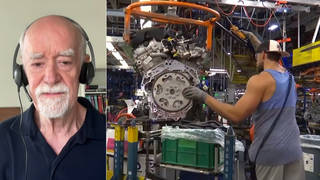
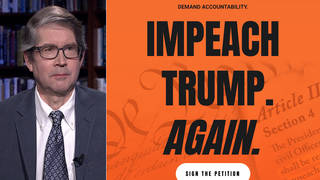
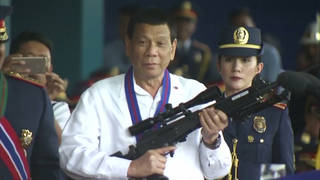
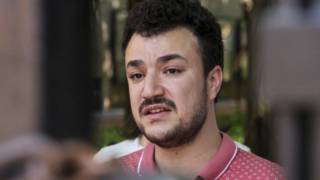





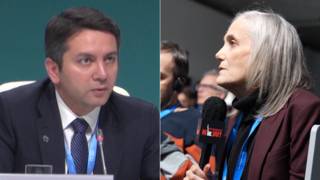

Media Options